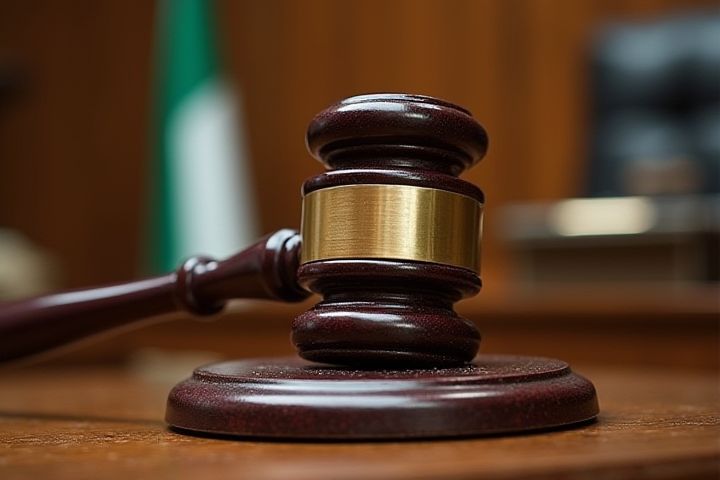
Nigeria's legislative branch, known as the National Assembly, consists of two houses: the House of Representatives and the Senate. The House of Representatives comprises 360 members elected from various constituencies across the country, while the Senate includes 109 members, with three senators representing each of Nigeria's 36 states and one from the Federal Capital Territory, Abuja. This bicameral structure is designed to ensure representation from diverse regions and interests within the country. Lawmaking in Nigeria requires the collaboration of both houses, as proposed legislation must be approved by each chamber before being presented to the President for assent. The legislative branch also plays a critical role in budget approval, oversight of the executive, and protecting citizens' rights through law.
Bicameral system
Nigeria's legislative branch operates on a bicameral system, comprising the Senate and the House of Representatives. The Senate is made up of 109 members, with three senators elected from each of the 36 states and one from the Federal Capital Territory. The House of Representatives consists of 360 members, who represent various constituencies across the country, ensuring diverse regional representation. This structure enables the legislative branch to create and amend laws, oversee the executive branch, and represent the interests of Nigerian citizens effectively.
National Assembly
The legislative branch of Nigeria, embodied in the National Assembly, focuses on creating and amending laws that govern the nation. Comprising two chambers-- the House of Representatives and the Senate-- the National Assembly holds significant authority to debate issues, approve budgets, and confirm presidential appointments. The representation structure ensures that diverse interests from various states and regions are considered in policy-making. Your engagement with this legislative process can influence governance and accountability, emphasizing the importance of civic participation in Nigeria's democracy.
Senate
The legislative branch of Nigeria, particularly the Senate, focuses on several key responsibilities, including lawmaking, budget approval, and oversight of the executive branch. Comprised of 109 senators, the Senate ensures representation across the country's geopolitical zones, with each state contributing three senators and the Federal Capital Territory, Abuja, contributing one. Senators engage in deliberations on proposed bills, scrutinizing their implications for national development and public welfare. Additionally, the Senate plays a critical role in confirming presidential appointments, particularly for key positions in the judiciary and executive agencies.
House of Representatives
The House of Representatives in Nigeria's legislative branch is integral to creating and amending laws that govern the country. Composed of 360 members elected by constituencies from across the 36 states, it actively represents the interests of the populace. The House engages in critical discussions on national issues, including budget proposals, economic policies, and social reforms. Oversight functions are also a significant aspect, allowing the House to hold the executive accountable, ensuring transparency and adherence to the rule of law.
109 senators
The legislative branch of Nigeria is primarily focused on lawmaking, representation, and oversight, with 109 senators comprising the Senate. These senators represent the three geopolitical zones, with each zone contributing 36 senators, alongside one additional senator for the Federal Capital Territory, Abuja. The Senate is responsible for reviewing and approving legislation, ratifying treaties, and confirming presidential appointments, playing a crucial role in governance. By engaging in debates and committee work, the Senate ensures that diverse perspectives from across Nigeria are considered in the policymaking process, ultimately shaping national development.
360 representatives
The Nigerian legislative branch, known as the National Assembly, comprises two chambers, with the House of Representatives featuring 360 elected members who represent diverse constituencies across the country. This body primarily focuses on enacting laws, approving budgets, and addressing national issues impacting the populace. Each representative plays a crucial role in advocating for their constituents' interests, engaging in debates, and contributing to policy-making processes. Your active participation in civic matters can influence the legislative agenda and enhance accountability within the government.
Lawmaking duties
The legislative branch of Nigeria, comprised of the National Assembly, is primarily focused on lawmaking duties that shape the country's legal framework. It consists of two houses: the Senate and the House of Representatives, each playing a critical role in proposing, debating, and passing legislation. The process involves drafting bills, reviewing existing laws, and conducting public hearings, ensuring that various stakeholders' interests are considered. By overseeing the nation's budget and policy implementation, the National Assembly holds the executive accountable while fostering democratic governance and national development.
Budget approval
The legislative branch of Nigeria, primarily comprising the National Assembly, plays a crucial role in the budget approval process. This includes comprehensive scrutiny of the Executive's proposed budget, assessing its alignment with national priorities and economic goals. The National Assembly sessions involve committees that meticulously analyze budget allocations for various sectors such as health, education, and infrastructure. Your engagement in this democratic process can impact the effectiveness of governance and public resource management in Nigeria.
Oversight functions
The Nigerian legislative branch, comprising the National Assembly, primarily focuses on oversight functions to ensure accountability and transparency in government operations. This includes monitoring the implementation of laws, evaluating public spending, and scrutinizing executive actions to prevent corruption and maladministration. By conducting public hearings and investigations, legislators gather evidence and assess the effectiveness of government policies and programs. Engaging with civil society and constituents, the legislature aims to represent your interests and improve governance through informed legislative oversight.
Committee system
The legislative branch of Nigeria, primarily represented by the National Assembly, employs a committee system to enhance its effectiveness in governance. This system allows lawmakers to specialize in specific areas such as finance, health, and education, addressing issues with greater expertise and focus. Committees conduct detailed investigations, review proposed legislation, and monitor government activities, fostering transparency and accountability in the legislative process. As a result, you can expect more informed decision-making and increased citizen engagement in Nigerian legislative affairs.
